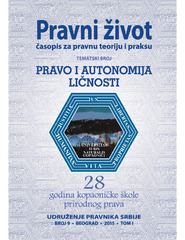Приказ основних података о документу
Doživotni zatvor : pro et contra
Life imprisonment : pro et contra
| dc.creator | Kolarić, Dragana | |
| dc.date.accessioned | 2024-03-01T13:14:08Z | |
| dc.date.available | 2024-03-01T13:14:08Z | |
| dc.date.issued | 2015 | |
| dc.identifier.issn | 0350-0500 | |
| dc.identifier.uri | https://jakov.kpu.edu.rs/handle/123456789/1660 | |
| dc.description.abstract | At the time when this paper was written there was an ongoing discussion regarding life sentence since one version of the Draft Law on Amendments to the Criminal Code dating from the first quarter of this year, in Article 43 of the Criminal Code prescribed to introduce three types of the penalty instead of a uniform custodial sentence - imprisonment: life imprisonment, imprisonment and house arrest. After several months of the public debate, in which many representatives of judicial bodies, scientific public, the representatives of international and regional organization, as well as government and non-government sectors took part, the provisions regarding the life sentence were left out from the latest Draft Law on Amendments to the Criminal Code in order to continue the public debate on this particularly sensitive type of penalty. Taking into account the need for argument-supported and critical analysis of the then suggested solution, it is our goal to assess the main reasons stated in favour of this penalty as well as those against life imprisonment. Amendments to the general part of the Criminal Code are very rare. Possible interventions refer to the field of criminal sanctions. Some traditional, classic institutes are rarely affected. The Law on the Amendments to the Criminal Code accordingly refers mostly to the contents of the special part of criminal legislation and possibly to the field of criminal sanctions. In criminal-political sense, introduction of life sentence would lead to strengthening of criminal-law repression. When recommending such a solution, the legislator must take into account the comparative legal tradition and standards in other countries, as well as the practice of the European Court for Human Rights in Strasbourg particularly with reference to prescribing the length of the penalty as a condition for the possibility of parole for a person sentenced to life imprisonment. The explicit attitude of the European Court for Human Rights dating from 2013 is that this possibility must be ensured for the person sentenced to life imprisonment. | sr |
| dc.language.iso | sr | sr |
| dc.language.iso | en | sr |
| dc.publisher | Beograd : Udruženje pravnika Srbije | sr |
| dc.relation | info:eu-repo/grantAgreement/MESTD/Basic Research (BR or ON)/179045/RS// | sr |
| dc.relation | info:eu-repo/grantAgreement/MESTD/Integrated and Interdisciplinary Research (IIR or III)/47015/RS// | sr |
| dc.rights | openAccess | sr |
| dc.rights.uri | https://creativecommons.org/licenses/by/4.0/ | |
| dc.source | Pravni život : časopis za pravnu teoriju i praksu. - Tematski broj: Pravo i autonomija ličnosti, T. 1, [28. godina Kopaoničke škole prirodnog prava, 13–17. decembar 2015] | sr |
| dc.subject | life imprisonment | sr |
| dc.subject | doživotni zatvor | sr |
| dc.title | Doživotni zatvor : pro et contra | sr |
| dc.title | Life imprisonment : pro et contra | sr |
| dc.type | conferenceObject | sr |
| dc.rights.license | BY | sr |
| dc.citation.volume | 64, knj. 578 | |
| dc.citation.issue | 9 | |
| dc.citation.spage | 641 | |
| dc.citation.epage | 657 | |
| dc.identifier.rcub | https://hdl.handle.net/21.15107/rcub_jakov_1660 | |
| dc.identifier.fulltext | http://jakov.kpu.edu.rs/bitstream/id/6924/766.pdf | |
| dc.type.version | publishedVersion | sr |
| dc.identifier.cobiss | 516957628 |


